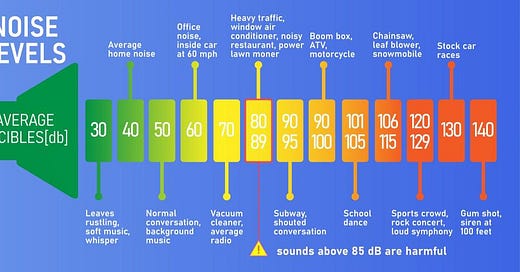“In a Clean Air Act overview report published by the EPA, the fact that we can't “see, taste or smell” sounds may explain why it has not received as much attention as other types of pollution, like air pollution. We are constantly surrounded by noise, yet many of us are unaware of the danger environmental noise poses to our health.” Environmental Health Sciences Center at UC Davis, March 3, 2023
Those of us who have lived in urban areas most of our adult lives have learned to accept the human-made noise that envelops us. While our brains seem to filter it down to a low roar, our bodies tell us something different: Chronic noise, whether intermittent intrusions like several daily plane flights over our neighborhood, or the constant sound of road traffic and construction, “ …is a largely unrecognized health threat that is increasing the risk of hypertension, stroke and heart attacks worldwide, including for more than 100 million Americans.”, according to a recent New York Times article. And those maladies are in addition to hearing loss, increased stress and anxiety, and sleep disturbance as a direct result of exposure to excessive, unnatural noise in our environment.
What’s perhaps even more concerning is the finding that our bodies really don’t adjust to unnatural levels of noise over time. In fact, the opposite appears to be true. According to the same Times article, “Prior noise exposure primes the body to overreact, amplifying the negative effects.” The graphic below shows the noise level danger zones and what activities are associated with increasing (and harmful) decibel levels.

Not only do noise decibel levels increase with population density, as one might expect, it also increases in areas of non-white populations. It turns out that noise pollution, along with every other type of environmental pollution, relentlessly tracks poor and minority neighborhoods. According to a study by the National Institute of Health (NIH) published in 2017, both daytime and nighttime noise levels were higher in Black, Hispanic and Asian neighborhoods and in areas of lower economic status. But overall noise levels were much lower in predominately white, wealthier neighborhoods. Why? Because communities that are wealthier have more political power and can more easily influence industry decisions on where the next manufacturing plant will be located and the construction of highways and other major industrial projects likely to alter the “quiet enjoyment” of a wealthy community’s property. The wealthy also have more funds to insulate their homes with triple-pain windows, soundproofing and other expensive products that are out of reach for people living in poorer neighborhoods. Perhaps more eloquently stated, here is what a co-author of the NIH study had to say about this disparity:
“In highly segregated metropolitan areas in the United States, differences in political power across race and class lines affect decision making about the siting of undesirable land uses, including major industries or roadways,” says Rachel Morello-Frosch, a study coauthor and UC Berkeley professor.
In 2022, the US EPA created a new office of “Environmental Justice and External Civil Rights”, combining several different EPA offices to: “work alongside each other to protect public health and the environment for all communities.” And the Inflation Reduction Act, signed into law in 2022, allocated billions of dollars to the federal EPA to confront the climate crisis, with $2.7 billion of that money specifically allocated to environmental justice work.
The US EPA administers the Clean Air Act, including Title IV of the Act that calls for the study and monitoring (but not yet regulation) of noise pollution. Because noise pollution is directly linked to a variety of serious health problems and disproportionally impacts lower income and minority communities like all types of environmental pollution, it should fall within the purview of the new Environmental Justice And External Civil Rights Office.
—————————————————————————————————————
I’d love to hear your thoughts on your own communities and the level of noise pollution you live with. Anyone, like me, suffer from hearing loss that is at least partially attributable to high decibel sounds where you live or work? Please take a moment and share your thoughts in the Comment Section below:
If you are not already a subscriber, why not take this opportunity to join our community with a free or paid subscription? A new paid subscription or an upgrade from a free to paid subscription will allow me to expand this newsletter with additional, primary source information, like interviews and public information requests, and expanded podcast offerings to include real, live guests. Although I won’t be going on strike any time soon, the current TV writer’s strike demonstrates that writer’s deserve to be paid, and paid well for their work, just like any other profession. Thank you in advance for your financial support of my writing!
P.S. I apologize for the delay between posts recently. Speaking of medical maladies, I’ve been sick and so has my elderly cat, Bella, who’s made an appearance on Crime and Punishment several times. We hope to get back on track in the next week or so! Thanks for your patience.













Share this post